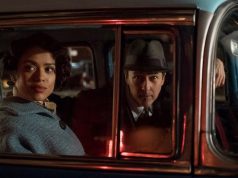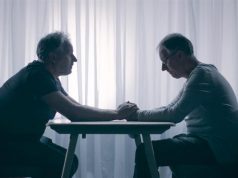When “Caché” (“Hidden”) begins, the camera is fixed on an ordinary alleyway in an ordinary French city. The shot is stationary, but it’s cluttered, full of walls, balconies, cars and other objects, arranged asymmetrically. We get the impression we should be examining the shot carefully, like a “Where’s Waldo?” puzzle, looking for something important.
We’re not the only ones. It turns out what we’re seeing is video footage shot by an anonymous person and left on the doorstep of the Laurent family, the people whose front door is at the center of the shot. It’s two hours’ worth of surveillance in which nothing unusual happens; just the usual Laurent comings and goings. All it shows is that someone, for some reason, is videotaping them. The Laurents view the tape intensely, looking for clues to the identity of its cinematographer, and to his reasons for filming them.
The Laurents are unnerved, obviously. They don’t have any major secrets to keep, but such voyeurism intrudes on their upper-class sense of justice. You don’t go around videotaping people’s apartments for two hours, even if it’s from the outside and therefore perfectly legal. That sort of thing just isn’t done.
Georges Laurent (Daniel Auteuil) hosts a literary talk show on French television. His wife Anne (Juliette Binoche) is a publisher. They have a 12-year-old son, Pierrot (Lester Makedonsky), who is beginning to endure some of the moodier aspects of adolescence. Georges wonders if maybe one of Pierrot’s friends made the tape as a joke.
Then a second tape arrives, with additional footage shot from the same vantage point, this time accompanied by a crayon drawing of a boy with a bloody mouth. Then there’s a third tape, this time shot on location at Georges’ childhood home, with a more graphic crayon drawing accompanying it. The level of alarm progresses from there. Who is sending these tapes? What message does he or she intend to convey?
“Caché,” from Austrian-born writer/director Michael Haneke (whose last film, “The Piano Teacher,” was disturbing for different reasons), is a film about chickens coming home to roost, about arrogant people refusing to accept responsibility for their past sins. As the Laurents conduct a search for their videographer, they reopen old wounds and uncover prior offenses they had forgotten about.
And through it all, we are watching closely, examining every frame, feeling the tension and suspense the Laurents feel. We get the sense that something is lurking in the shadows, waiting to pounce. Haneke stages many scenes so that they unfold in one long take, without the camera having to move or cut away. All movies are voyeuristic, of course — we’re watching people who don’t know they’re being watched — but Haneke ratchets that sensation up a bit by conspicuously avoiding fast editing and close-ups. In one scene, we follow Georges and Anne to their car. They get in, but the camera does not, and neither does the microphone. We keep listening to the conversation, only now it’s muffled. We feel like we’re intruding.
I’m reminded of another stellar foreign-language thriller from this year, the Korean “Oldboy.” It was also about a man with a mysterious tormentor bent on punishing him for past offenses. Where “Oldboy” had a more traditional “reveal,” where everything is spelled out and the mystery is solved, “Caché” lives up to its title by leaving a few things hidden. Yet the clues seem to be there. The very last shot is the exterior of a location we have seen before. There are a lot of people in the shot. Watch it closely. Does it explain anything?
A- (1 hr., 57 min.; French with subtitles; )





